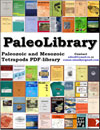
Complete Data Base of Paleozoic and Mesozoic Tetrapods.
Paleo-News and illustrations. Big electronic PDF-library.
| |
| PaleoNews |
| Classification |
| Books and Articles |
| Contact |
| Forum |
сайт о динозаврах
рейтинг сайтов
Free Counter
myspace hit counter
New species of 'weird bird'-like dinosaur discovered in China - Named Tongtianlong limosus - which means “muddy dragon on the road to heaven” - the dinosaur appears to have died after getting stuck in the mud |
|
by Nicola Davis A farmer and construction workers in China have discovered the remains of a new species of bird-like dinosaur that appears to have died after getting stuck in the mud. The find, experts say, adds weight to the idea that such animals were thriving shortly before the mass extinction 66 million years ago. Around the size of a sheep, with a beak, wings and a crest on its head, the flightless creature is thought to be a species of oviraptorosaur - a group of bird-like, feathered, toothless and short-skulled non-avian dinosaurs that were roaming the land in the period shortly before an asteroid slammed into Earth off the coast of Mexico, triggering the annihilation of swaths of life. “If you saw it alive you would just think it was a weird bird,” said Stephen Brusatte, a palaeontologist at the University of Edinburgh who, with colleagues in China, co-authored the research published in the journal Scientific Reports. But the newly discovered dinosaur appears to have suffered an untimely demise. “It looked like it got trapped in mud, and that’s how it died,” said Brusatte. “The neck is arched, the head is raised up, like it’s sticking its head above something, and both of the arms are outstretched and to the sides of the body, and so it’s like it’s trying to free itself.” Named Tongtianlong limosus - “muddy dragon on the road to heaven” - the dinosaur’s fossilised remains were discovered on the building site of a high school near Ganxian, in the Jiangxi Province of southern China. The fossils were unearthed by construction workers who were using TNT to blast away rocks - an activity which, while unexpectedly bringing the dinosaur’s remains to light, also appears to have blown away parts of the fossil, including sections of its arms and tail and its right hind leg. Thought to have lived between 72 million and 66 million years ago, the newly discovered dinosaur sheds light on the ecosystem just before the fateful asteroid struck. “Not only were there still a lot of dinosaurs, but they were still actively diversifying - there were still many new species that were coming about,” said Brusatte.Brusatte adds that the new discovery joins a number of recent oviraptorosaur finds from southern China, suggesting that such bird-like omnivores were on the rise before falling foul of the mass extinction. “What it is looking like is that these things were probably pretty common parts of the dinosaur ecosystem,” he said. “This really was probably the last wave of dinosaur diversification before the asteroid came.” Paul Upchurch, professor of palaeobiology at University College London who was not involved in the research, said that while the posture of the dinosaur was unusual, there was little to be gleaned from the pose. “No-one knows what it means,” he said. “It’s an odd quirk, but scientifically it doesn’t take us anywhere.” But, he added, the discovery of a new species of oviraptorosaur adds weight to the argument that rather than being in decline before the mass extinction, dinosaurs might have been flourishing. “It doesn’t win the argument one way or the other, but it is another point in favour, perhaps, of suggesting that there were certainly some places in the world where they were doing absolutely fine,” he said. https://www.theguardian.com/science/2016/nov/10/new-species-of-weird-bird-like-dinosaur-discovered-in-china-tongtianlong-limosus
|
